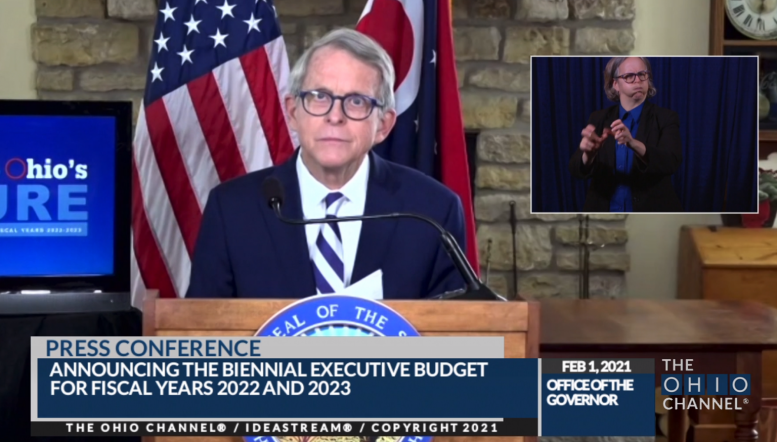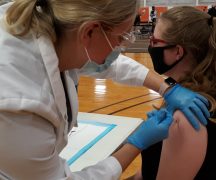A year ago Wednesday, the coronavirus pandemic officially started in Ohio when the decision was made to cancel The Arnold sports festival.
On Thursday, Gov. Mike DeWine gave a primetime address to tell Ohioans that a return to normal is in sight — so long as they don’t become complacent.
“No marathoner pulls out on purpose at the 25th mile marker,” DeWine said.
The governor made some news during the speech. He announced that he would lift all remaining health orders once the number of coronavirus cases drops to 50 per 100,000 Ohioans.
That might seem distant, with Wednesday’s rate standing at 179 per 100,000. But DeWine noted that the rate has been falling rapidly, from 445 on Feb. 23 and 731 on Dec. 3.
“Ohio is on the right path to get us to 50,” DeWine said.
However, such drops can’t be counted on to continue. Federal health officials reported this week that daily numbers appear to be hitting a plateau at levels that might seem low after the past several months, but were perceived as quite high last summer.
Also concerning is that at least six worrisome variants of the virus are struggling to gain a foothold. Some are more transmissible, others more lethal and still others less susceptible to the three vaccines that have been approved in the United States.
DeWine’s unusual primetime speech was to mark the one-year anniversary of Ohio’s fight against the disease.
“None of us then fully understood the battle ahead,” he said. “This has been a tough year. Many of you have lost a parent. grandparent, sibling, spouse. Some of you have even lost a child. Some of you have lost your job. Some of you have lost your business.”
It also was to announce the metrics by which he’ll decide to lift remaining health orders.
But it also seemed a repudiation of two other Republican governors’ announcements in recent days that they were lifting all of their orders — including ones requiring mask wearing in indoor public spaces. Texas Gov. Greg Abbott and Mississippi Gov. Tate Reeves both made such announcements on Tuesday, prompting widespread condemnation from public health experts and from President Joe Biden.
Anthony Fauci, the leading communicable disease expert in the country, said the daily number of new cases needs to be one-sixth of what it is now before ending mask mandates should be considered.
DeWine didn’t mention other states, but he made it clear that Ohio’s mask mandate would remain in place for the time being. As he touted the rapidly growing number of vaccines coming into Ohio, he said, “We have one battle-tested tool that has worked so well and that is the mask.”
The governor also appealed to Ohioans’ community spirit — a spirit that critics have said is lacking in Abbott and Reeves’ approach to the pandemic.
“It’s been a difficult year,” DeWine said. “But we did what Ohioans always do. We rallied together. We sacrificed. We showed the world our Ohio grit. Our communities have come together.”
***
Also from Ohio Capital Journal:
Black Ohioans are 13% of state population, but 5.6% of the vaccine recipients
Of more than 1.8 million Ohioans who have received at least one COVID-19 vaccination dose, only 5.6% went to Black Ohioans, who comprise about 13% of the population.
The inequity is the latest example of disparate health outcomes in the state and nation along racial lines.
The math is slightly worse among the nearly 1 million Ohioans who are fully vaccinated, mostly by two-dose vaccines: Just 5% of them are Black.
Disparities in health outcomes aren’t new. However, that such a gaping underrepresentation arises in a brand-new system — Ohio’s vaccination campaign began Dec. 14 — spotlights a deep-seeded glide path of racial inequality in American health care. READ MORE
Anti-discrimination ‘Fairness Act’ back in legislature with more GOP support
A bill to add LGBTQ people to the list of those protected from discrimination in the state of Ohio is once again coming to the legislature, this time with more bipartisan support.
As she has done in every General Assembly since she became a senator in 2011, State Sen. Nickie Antonio, D-Lakewood, is sponsoring the Ohio Fairness Act in the Senate. Her cosponsor this time around is Sen. Michael Rulli, R-Salem.
“We’re not looking for a parade or fireworks, we just want to do a common-sense approach to this bill,” Rulli said during a Thursday press conference announcing the new measure.
Antonio said with the state putting millions of dollars into an ad campaign to bring employees and business to the state, that effort should include creating a more welcoming environment for workers in the LGBTQ community. READ MORE





